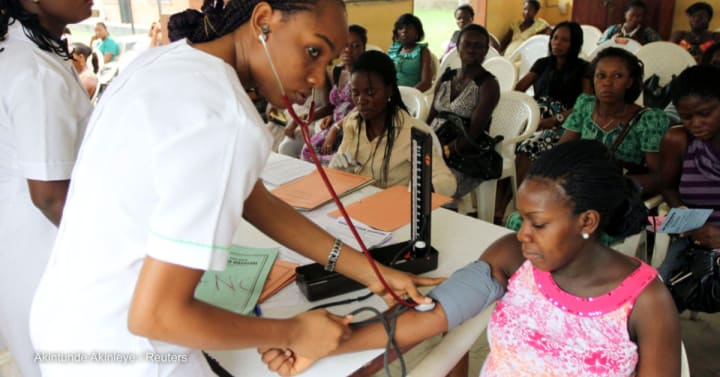
WHO, UNFPA launch new 2025 targets to reduce maternal deaths
- Health Sector
- No Comment
- 187

The world is currently off track from meeting Sustainable Development Goal 3.1, which aims to reduce global maternal mortality to less than 70 per 100,000 live births by 2030. On Tuesday, a coalition of stakeholders working in maternal and newborn health launched new voluntary targets in hopes to renew focus on the goal and help countries accelerate efforts to achieve it.
The targets — launched under the Ending Preventable Maternal Mortality initiative, currently co-chaired by the World Health Organization and the United Nations Population Fund — are proposed for 2025.
At the global level, the targets include getting 90% of pregnant women to attend four or more antenatal care visits, 90% of births to be attended by a skilled health personnel, 80% of women to have access to postnatal care within two days of giving birth, at least 60% of pregnant women to have access to emergency obstetric care within a two-hour travel time, and 65% of women — aged 15 to 49 — to be able to make informed and empowered decisions with regard to sexual relations, contraceptive use, and reproductive health.
The targets also include national and subnational ones. For antenatal care visits for example, national coverage should be more than 70% of pregnant women for 90% of countries, and the subnational coverage should be more than 70% of pregnant women for 80% of districts.
“Women can set the agenda, and this agenda can then translate into action if we listen to women.”— Tariah Adams, communication and advocacy officer, White Ribbon Alliance in Nigeria
EPMM stakeholders urge governments, donors, the private sector, and members of civil society to adopt the targets in national policies and strategies, convene action groups to track progress, and strengthen intersectoral policy dialogues.
Some of the targets are in line with the 2025 targets launched under the Every Newborn Action Plan in 2020, and 19 priority countries have been identified for initial implementation.
These countries were chosen based on a range of criteria, such as the high burden of maternal deaths and stillbirths in the country, and the presence of a partner at the country level that could help strengthen partnerships to support the health ministry, said Dr. Anshu Banerjee, director for the Department of Maternal, Newborn, Child and Adolescent Health and Ageing at WHO.
But Dr. Willibald Zeck, global maternal and newborn health thematic fund coordinator for UNFPA, said countries that are not included can still use the targets, and that the list will be expanded later on.
The third set of papers in a series of research examining the state of nutrition for young children and women outlines the steps to reach scale.
“We had to select regions and we had to select … the capacities that are there, and then also whether there’s an opportunity to engage and also willingness to engage. So whoever is not on the list, please don’t think that … you cannot use the targets and milestones. Of course you can,” he said during an online launch event for the targets.
Giving women voices
According to WHO, current estimates show the global maternal mortality ratio is at 211 per 100,000 live births, far behind the SDG 3.1 target.
During her remarks at the same event, UNFPA Executive Director Dr. Natalia Kanem said that if the current pace continues, the world won’t achieve SDG 3.1 before 2065. While “good progress” has been made, she said “good isn’t good enough” when over 800 women die each day from pregnancy and childbirth complications, and others suffer from morbidities and debilitating conditions like obstetric fistula.
An estimated 295,000 women die each year from pregnancy and childbirth complications, the majority of which, at 94%, occurred in low-resource settings, according to WHO, based on 2017 data.
To make real progress, a key aspect that a number of experts during the event’s panel discussion highlighted was the need to incorporate the voices of women themselves who are receiving care.
Tariah Adams, communication and advocacy officer for the White Ribbon Alliance in Nigeria, said there needs to be much more effort to bring the voices of women in setting the health agenda. In one of the organization’s campaigns, she said the number one thing women in Nigeria asked for was cleaner facilities. They took that feedback to community leaders which was received well, with water now available in about 10 health facilities in Niger state, Adams said.
“I don’t have the data [on the] increase of women going to the facility, but it shows that women can set the agenda, and this agenda can then translate into action if we listen to women,” she said.
Panelists also talked about investing in health workers, including midwives, and making sure there’s not only data to track progress against targets, but that they are being used to drive improvements.
According to the 2021 State of World’s Midwifery report, there is currently a shortage of 900,000 midwives globally. Midwives also receive low pay and aren’t often given leadership positions, said Franka Cadée, president of the International Confederation of Midwives, who added that midwives also want to be part of setting the health agenda.
“In the patriarchal system that we’re working in, often people want midwives to do the work, but they don’t want us to say how we think it should be done. And that needs to change,” Cadée added.
Jenny Lei Ravelo
Devex
Read more: https://www.devex.com/news/who-unfpa-launch-new-2025-targets-to-reduce-maternal-deaths-101772





